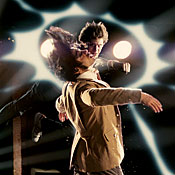- REVIEW
- READER REVIEWS
Scott Pilgrim vs. the World
|
(No longer in theaters)
|
|
Genre
Action/Adventure
Producer
Marc Platt, Eric Gitter, Edgar Wright, Nira Park
Distributor
Universal Pictures
Release Date
Aug 13, 2010
Release Notes
Nationwide
Official Website
Review
At first the crazy-quilt inventiveness of Scott Pilgrim vs. the World can put you over the moon: Yes, this is how you bring a graphic novel to life onscreen! The British director Edgar Wright made Shaun of the Dead and Hot Fuzz, and he understands the healthy connection between ordinary dreamers and their huge, melodramatic, movie-infused dreams. He takes Bryan Lee O’Malley’s Canadian mangas (in which the mundane meets the superheroic) and concocts a syntax all his own: part comic panel, part arcade video game—from the era of Pac-Man and Galaxian and Space Invaders, before virtual reality killed so much of the fun. The anarchic Warner Bros. cartoonist turned feature director Frank Tashlin (Will Success Spoil Rock Hunter?) would have been too happy watching Wright at play: Locations feature pop-up “fun facts,” sounds come with illustrative words (“ding dong!”), a smooch triggers pink hearts. And that’s before the 22-year-old slacker-guitarist Scott Pilgrim (Michael Cera) becomes a ker-powing superman above the stages of Toronto’s rock clubs.
Nothing, by the way, explains his sudden surge of superheroism: no gamma rays or mutant spider bites. The rest of the time, pathetic Scott shares a mattress in a crummy dive with his gay friend (Kieran Culkin) and dates (i.e., almost holds hands with) a high-school girl named Knives Chau (the touchingly buoyant Ellen Wong)—until he glimpses the magenta-haired deadpan punk Ramona Flowers (Mary Elizabeth Winstead) and, pursuing her, finds himself under siege by a string of jealous exes (seven, to be precise), usually while his band is playing. This is kung-fu fighting of the flying, flinging, wall-shattering sort, sometimes broken up by songs, guitar riffs, and, in one scene, a kick-line of demon hipster chicks. The screen splits horizontally: Scott rockets from right to left on top while his adversary barrels from left to right below—and when they meet, the frames explode and merge in a shower of sparks. The spectacle is outlandish, yet it’s somehow in sync with what rockers feel at their most transcendent. The guitars here throw bolts at the sky.
Given these marvels, why doesn’t Scott Pilgrim vs. the World send you home on a high? Why isn’t it the coolest movie ever? One problem is, well, Scott Pilgrim. Cera dials down his patented semi-castrato hysteria and doesn’t play every scene on the defensive, but our superhero is still a super-cipher: callow, cowardly, morose. Some of those traits come from the graphic novel, but they don’t work onscreen as well as, say, Enid’s determined anti-enthusiasm in the film of Daniel Clowes’s Ghost World (which only just worked). It’s amusing when Cera barely manages to jilt the smitten Knives (“We should break up … or whatever”), but a tremulous creep is still a creep. He hardly seems worthy of Winstead’s Ramona, who gets an enchanting guitar intro courtesy of Frank Black’s “I Heard Ramona Sing” and inspires the film’s most lyrical sight gag: As she roller-skates into the night, the snow glows and melts under her board.
Does Wright feel any connection to this milieu? I doubt it. His other movies are movie-ish, but they work from the inside out: The Romero-like zombie plague of Shaun of the Dead is a horrific extension of provincial middle-class English complacency, of a world Wright knows intimately. Scott Pilgrim vs. the World is an outside-in kind of exercise. It’s ravishing, but the emotional stakes never seem very high. Nothing much is made of the supporting characters, among them Anna Kendrick as Scott’s dismissive sister. And the parade of super-villain exes—including Brandon Routh and Jason Schwartzman—is like a forced march; I felt I’d had my fill of the fights and there were still five exes to go. (Fortunately, numbers five and six turn out to be twins.)
The film is repetitive, top-heavy: Wright blows his wad too early. But a different lead might have kept you laughing and engaged. Cera doesn’t come alive in the fight scenes the way Stephen Chow does in the best (and most Tashlin-like) of all the surreal martial-arts comedies, Kung Fu Hustle. And Wright doesn’t have what Tashlin had in Bob Hope in Son of Paleface—a meta-comedian who could comment on the sundry absurdities. Cera is a superhero for an indecisive generation, which might work if the disjunction were played for satire. But it’s just a disjunction. Scott Pilgrim needs too much help from video games to really save the world.
Related Stories
New York Magazine Reviews
- David Edelstein's Full Review (8/9/10)
